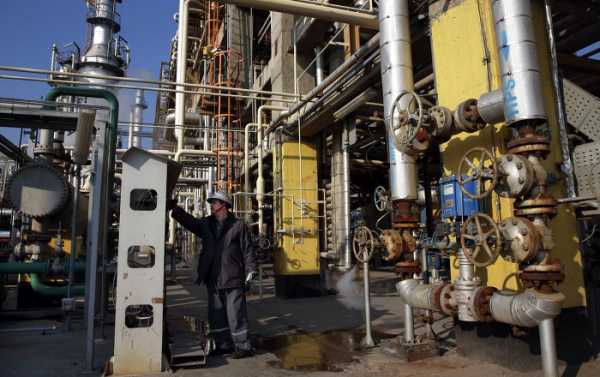
Iran is seeking to change its economic policies in the face of US sanctions by replacing several ministers, and drafting contingency plans – such as a fiscal stimulus package, diversification in foreign trade and investment ties, as well as an overall greater degree of self-reliance.
Kristian Rouz — Iranian President Hassan Rouhani has replaced several key officials on his government’s economic team as he seeks to enhance Iran’s self-reliance in the face of a new round of US sanctions. The move comes after the International Monetary Fund (IMF) said US economic restrictions could have pushed the Iranian economy into a recession.
The Iranian parliament approved changes to the nation’s top economic leadership proposed by Rouhani Sunday — and just several days before a US crackdown on Iranian oil exports takes effect. For his part, Rouhani has claimed the US is “isolated” in its urge to restrict Iran’s foreign trade.
The Iranian president also touted the EU’s intent to maintain economic ties with Iran in the new economic reality.
“It does not happen often that the US makes a decision and its traditional allies abandon it,” Rouhani said in his address to the parliament.
Rouhani has appointed technocrat economist Farhad Dejpasand as Iran’s new Minister of Economics and Finance. Dejpasand, along with his new team, are expected to find a way to maintain Iran’s economic stability in the face of an expected decline in oil revenues.
Other officials appointed by Rouhani include a new Labor Minister, as well as new chiefs in the Industry and Roads Ministries.
Some economists have said Iran is seeking to offset the looming decline in exports revenues by increasing its domestic tax and manufacturing base. Tehran has recently ramped up its domestic investment in infrastructure and the industrial sector in the form of fiscal stimulus — by ramping up its budget spending.
However, it remains unclear how the new Iranian economic team will mitigate the initial shock of a dramatic decline in oil revenues.
Earlier this month, the IMF said the Iranian economy could contract by as much as 1.5 percent in 2018 due to the projected slump in oil revenues. IMF economists said Iran’s recession could deepen to 3.6 percent next year.
This is compared to the IMF’s previous estimates of a 4-percent GDP expansion in Iran this year and next.
For its part, the EU has sought to establish a new payment system in order to continue ‘’business as usual” with Iran despite a massive outflow of dollar liquidity from the Iranian economy. European countries have reiterated economic relations with Iran are crucial to some of their multinational companies.
Meanwhile, Rouhani also urged national unity in the face of economic standoff with the US.
“Our main enemy, America, faces us with a drawn sword and we have to fight it and we have to unite. Regardless of factions… we are all part of the Iranian nation,” Rouhani said.
Rouhani’s statement comes as the government of the Islamic Republic appears to be divided over how to address the challenges posed by US sanctions.
Some Iranian hardliners have urged a greater degree of self-reliance, at times going as far as rejecting the prospect of cooperating with the EU.
Iran’s moderates, on the contrary, are urging deeper ties between Iran, the EU, Russia, and China — in hopes that a possible increase in multilateral trade and investment could help the Islamic Republic withstand US restrictions.
Rouhani is trying to strike a compromise between these factions to rally greater support for his policies — both in Tehran and across the country.
“Russia, China, India, the European Union, and some African and Latin American countries are our friends,” Rouhani said. “We have to work with them and attract investments.”
The new round of US sanctions against Iran is set to go into effect on November 4, with the ultimate goal of bringing Iranian oil exports to zero.
Trump administration officials said the sanctions could be subject to review if the Islamic Republic changes some of its foreign policies, and engages in comprehensive nuclear talks in line with the UN’s Non-Proliferation Regime.
But Iranian officials have so far rejected such calls.
“By bringing up a discussion of missiles and other issues they are not following an appropriate path,” Chairman of Iran’s Assembly of Experts Ayatollah Ahmad Jannati said.
Amid the ongoing geo-political standoff, international energy markets are facing the prospect of a further decline in oil supply, which could provide additional boost to the oil prices. So far, however, international investors have already priced in the most obvious effects of these new Iran sanctions — but economic uncertainty stemming from US-Middle East relations still lingers.
Sourse: sputniknews.com






